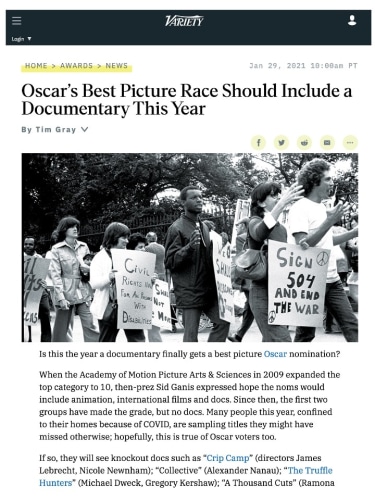Oscar’s Best Picture Race Should Include a Documentary This Year
Variety
01/29/2021
Back
By Tim Gray
Is this the year a documentary finally gets a best picture Oscar nomination?
When the Academy of Motion Picture Arts & Sciences in 2009 expanded the top category to 10, then-prez Sid Ganis expressed hope the noms would include animation, international films and docs. Since then, the first two groups have made the grade, but no docs. Many people this year, confined to their homes because of COVID, are sampling titles they might have missed otherwise; hopefully, this is true of Oscar voters too.
If so, they will see knockout docs such as “Crip Camp” (directors James Lebrecht, Nicole Newnham); “Collective” (Alexander Nanau); “The Truffle Hunters” (Michael Dweck, Gregory Kershaw); “A Thousand Cuts” (Ramona S. Diaz); and “Time” (Garrett Bradley). All are great, a combo of brains and heart. And the events in early January add urgency to the Stacey Abrams doc “All In: The Fight for Democracy.” If Oscar voters are looking for movies that capture the spirit of our era, these are a great place to start.
In 1950, Variety wrote about “Snobs,” a book by Russell Lynes. Among Lynes’ targets were movie snobs who think any Hollywood offering is inferior to foreign films and documentaries, or, as some Brits called them, “actuality films.” Lynes wisecracked that docus dealt with such topics as “the primitive life of a gannet or the effects of alcohol on cats.”
That image of documentaries has survived for 70 years: esoteric, serious and boring.
Au contraire, mes amis. Many 2020 docus deal with hot-button topics, including “The Dissident” (Bryan Fogel), about the murder of Jamal Khashoggi; “The Fight” (Eli B. Despres, Josh Kriegman, Elyse Steinberg), which follows ACLU battles during the Trump administration; “The Human Factor” (Dror Moreh), looking at the Mideast peace process: “White Noise” (Daniel Lombroso), which covers the alt-right movement; and “76 Days” (Weixi Chen, Hao Wu), which documents Wuhan, China and COVID.
Voters are advised to see as many as possible, plus the documentaries written about in other current Variety articles. But don’t think of this as homework. Docus are too good for that.
My colleague Clayton Davis has predicted five contenders for a feature-doc Oscar nom: “Totally Under Control” (Alex Gibney), “Boys State” (Amanda McBaine, Jesse Moss), “Dick Johnson Is Dead” (Kirsten Johnson), “Time” and “John Lewis: Good Trouble” (Dawn Porter). A few more of my faves: “Gunda” (Viktor Kossakovsky), “Oliver Sacks: His Own Life” (Ric Burns), “Our Time Machine” (S. Leo Chiang, Yang Sun), “The Reason I Jump” (Jerry Rothwell) and “Rewind” (Sasha Joseph Neulinger).
When Variety started covering movies in 1907, the word “documentary” was used exclusively in a legal context, as in “documentary evidence” at a trial.
But of course the French — who gave the world the Lumiere brothers and Georges Melies — paved the way in docus. In June 18, 1920, Variety reported that Monsieur L. Gaumont in Paris had presented “The Victory Parade,” filmed “in natural colors.” Gaumont bragged it was “the most important documentary film ever recorded” — the first use of the word to describe a movie in Variety.
Every year, a growing number of docs are submitted for Oscar’s international film race. This year’s roster includes “Babenco: Tell Me When I Die” (Brazil), “Collective” (Romania), “The Mole Agent” (Chile), “Notturno” (Italy), “The Letter” (Kenya), “River Tales” (Luxembourg) and “Once Upon a Time in Venezuela” (Venezuela).
Under Acad rules, each country gets only one submission in that race; by choosing a docu, the panels are saying, “Here’s the best that we have.” That’s a lesson for all Oscar voters as they consider the best pic category. A documentary is not a traditional choice, but it’s a valid one. And it might be the best choice.